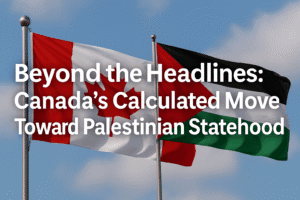Beyond the Headlines: Canada’s Calculated Move Toward Palestinian Statehood
Canada has joined the UK and France in committing to formally recognize Palestinian statehood at the UN General Assembly in September, marking a significant diplomatic shift. Prime Minister Carney framed this as an urgent response to Israel’s failure to prevent Gaza’s humanitarian crisis and the erosion of the two-state solution, stating there’s “no room for delay.” Crucially, recognition hinges on Palestinian Authority reforms: governance overhaul, Hamas-excluded elections by 2026, and demilitarization.
Israel fiercely rejected the move, with its ambassador calling it a reward for Hamas’ “barbarity” and an existential threat. This coordinated stance by key Western allies intensifies pressure on Israel while highlighting a growing rift with the US. The decision reflects deep international frustration with the status quo, aiming to salvage peace prospects by conditioning statehood on Palestinian accountability and peaceful governance. Canada’s gamble seeks to reset stalled negotiations by making recognition a tool for reform rather than an unconditional endorsement.

Beyond the Headlines: Canada’s Calculated Move Toward Palestinian Statehood
The announcement that Canada “intends” to formally recognize Palestine at the upcoming UN General Assembly isn’t just diplomatic news – it’s a seismic shift reflecting deep international frustration and a strategic gamble. Here’s the nuanced reality behind the headlines:
The Core Shift:
- Joining the Chorus: Canada now aligns with key European allies (UK and France) in setting a September deadline for recognition, moving beyond mere rhetoric supporting a two-state solution to concrete action.
- Carney’s Rationale: PM Carney explicitly frames this as a response to the “steadily and gravely eroded” prospects for peace. He directly criticizes Israel’s failure to prevent the “rapidly deteriorating humanitarian disaster” in Gaza, arguing that the current path makes a future two-state solution impossible.
- The Moral Imperative: The statement powerfully links recognition to “the dignity of all human life” and supporting “all people who choose peace over violence.” This positions the move as a moral necessity, not just political strategy.
The Critical Conditions:
- Not a Blank Cheque: Crucially, Canada’s recognition is predicated on significant Palestinian reforms:
- Fundamental governance reform by the Palestinian Authority (PA).
- Holding general elections by 2026, explicitly excluding Hamas.
- Demilitarization of the future Palestinian state.
- A Message to Hamas & the PA: While urging Hamas to release hostages, the conditions signal Canada won’t legitimize Hamas or reward violence. Simultaneously, it pressures the weakened PA under President Abbas to undertake long-overdue reforms to be a credible partner.
Israel’s Fierce Rejection:
- Ambassador Moed’s response is uncompromising: Recognition is seen as surrendering to pressure and rewarding the “monstrous barbarity” of October 7th.
- The core Israeli argument: Recognition is premature and dangerous without a “benevolent leadership” in place capable of ensuring Israel’s security. The charge of “legitimizing Hamas” is central to their outrage.
- The Existential Stakes: Moed frames this in existential terms – preventing a “jihadist state” seeking Israel’s “annihilation” on its “ancestral homeland.”
The Bigger Picture:
- Mounting Pressure: Canada joining the UK and France creates a significant bloc of traditional US allies applying unprecedented pressure on Israel regarding Gaza’s humanitarian crisis and the future political horizon.
- The US Factor: This highlights the growing divergence between the US (still Israel’s staunchest defender) and key Western partners. The pressure on the US position intensifies.
- A Strategic Gambit: By setting conditions, Canada attempts a delicate balance: pushing for Palestinian statehood as essential for peace while demanding the Palestinians build a credible, peaceful, and accountable state – distinct from Hamas. It’s an effort to reshape the dynamics towards a viable solution.
Human Insight: The Value Beneath the Diplomacy
Canada’s move signifies more than a policy change; it reflects a profound loss of faith in the status quo. The relentless humanitarian toll in Gaza and the absence of a credible political process have forced even cautious allies to act. This isn’t blind support for Palestine, but a desperate bid to salvage the idea of a two-state solution before it vanishes entirely.
The conditional nature reveals the core dilemma: Recognizing Palestine is seen as necessary for justice and future peace, yet doing so unconditionally risks entrenching division or empowering extremists. Canada is betting that dangling recognition can compel internal Palestinian reform and signal to Israel that international patience for the current trajectory has expired.
What Truly Matters Next:
- PA Response: Will Abbas commit to meaningful reforms and elections, or will internal divisions and weakness stall progress, jeopardizing recognition?
- September Showdown: Will Canada, the UK, and France follow through? Will other nations join them at the UNGA?
- Israel’s Calculus: How will this coordinated pressure influence Israeli military strategy, settlement policy, and its own vision for Gaza’s “day after”?
- US Reaction: Will this coalition spur the US to adjust its approach, or deepen the transatlantic rift?
Canada‘s announcement is a pivotal moment, not an endpoint. It underscores that the international landscape surrounding the conflict is shifting fundamentally, driven by humanitarian urgency and a fading belief in incrementalism. The path ahead remains fraught, but the message is clear: the cost of inaction is now deemed higher than the risk of change.
You must be logged in to post a comment.